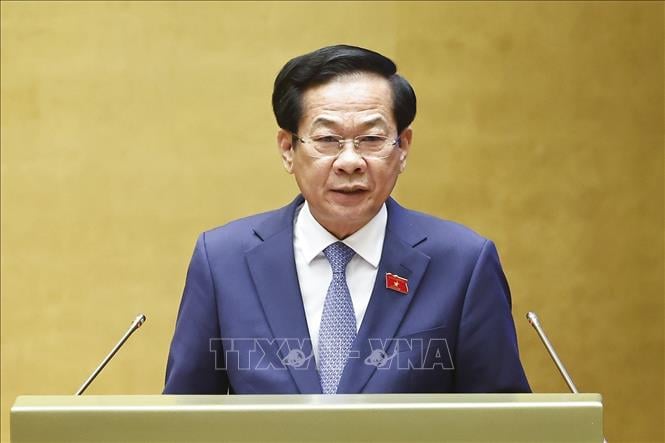
Minister of Home Affairs Do Thanh Binh explains and clarifies a number of issues raised by National Assembly deputies. Photo: Doan Tan/VNA
In response to comments from National Assembly deputies, the Ministry of Home Affairs - the drafting agency - will review the provisions on the basis, principles, methods of recruitment and the provisions on job positions in the draft law.
Regarding the authority to recruit civil servants, at this session, the Government submitted to the National Assembly a draft Resolution of the National Assembly on a number of specific and outstanding mechanisms and policies to make breakthroughs in education and training development, including regulations on the authority to recruit civil servants who are teachers in public educational institutions, and regulations on handling cases where there are differences in the same content between documents. Therefore, the specific regulations for teachers will be implemented according to the provisions of this Resolution. For other contents, the Ministry of Home Affairs will coordinate with agencies to review and ensure consistency between the draft law and the provisions of laws on specialized civil servant management.
Regarding allowing civil servants to sign labor contracts or service contracts to perform professional activities with agencies and organizations other than the public service unit where they work, the opinions of National Assembly deputies are highly unanimous in the policy of allowing civil servants to sign labor contracts or work contracts to create a mechanism for connecting human resources between the public and private sectors. At the same time, it creates conditions for civil servants to increase their legitimate income from their labor.
In addition, National Assembly delegates also expressed concern that civil servants must first ensure that they perform well and complete their assigned duties and tasks, and have specific mechanisms to avoid conflicts of interest and avoid taking advantage of policies that affect the transparency and reputation of the unit where they work.
In response to the opinions of National Assembly delegates, Minister Do Thanh Binh said that the Ministry of Home Affairs will review and adjust to ensure the principle of creating maximum conditions for civil servants in their professional activities, but at the same time must also ensure transparency, not allowing conflicts of interest and policy exploitation.
The Minister also said that the Ministry of Home Affairs will review and adjust to stipulate principles and authority for evaluating civil servants, ensuring regular, continuous, multi-dimensional evaluation based on results, quality of public service and people's satisfaction; apply digital technology, build a national database on civil servants to ensure publicity and transparency in evaluating, managing and developing the civil servant team.
Previously, in the discussion hall about the job positions of officials, delegate Nguyen Hoang Bao Tran (Ho Chi Minh City) emphasized that this is the pillar of the draft law, but there are still shortcomings in determining job positions when agencies change or merge. Many officials are transferred but are not allowed to give opinions, or have to do work that is completely different from their expertise, leading to a feeling of disappointment and reduced work efficiency.
The delegate proposed to add the last paragraph of Article 22 (job position of civil servants) to "When a unit reorganizes or merges, civil servants are allowed to give opinions on new job positions; if the job position changes and is not suitable for their expertise, the agency is responsible for retraining or temporarily arranging equivalent work to ensure a stable life".
According to delegates, this regulation will help officials feel respected and supported by the organization, increasing their commitment and responsibility.
Regarding the quality classification and use of evaluation results, delegate Tran pointed out that in reality, the criteria for evaluating civil servants after the reorganization of the apparatus are often unfair, still heavily qualitative and emotional. There are civil servants who are evaluated low just because they have changed units and have not yet adapted to the new environment. She proposed adding a new clause "In the first year after the reorganization of the unit, the results of civil servant evaluation need to consider the factor of changes in the working environment, not classifying 'not completing the task' if the objective cause is due to the organization", explaining that this both protects public employees and demonstrates the humanity of the law, encouraging civil servants to overcome difficulties to adapt.
“We are amending an important law that regulates the professional lives of more than 2.2 million civil servants nationwide. Every regulation, no matter how small, has a profound impact on their lives, thoughts, and beliefs,” said a delegate from Ho Chi Minh City. She hopes that the draft Law on Civil Servants (amended) will not only aim for tighter management, but also demonstrate a humane and companionate spirit – so that each civil servant, despite changing circumstances, will still be given the opportunity to continue contributing to the Fatherland and the people.
Source: https://baotintuc.vn/thoi-su/nhieu-vien-chuc-phai-lam-cong-vec-khac-chuyen-mon-giam-hieu-qua-cong-tac-20251113140436902.htm







![[Photo] Deep sea sand deposits, ancient wooden ship An Bang faces the risk of being buried again](https://vphoto.vietnam.vn/thumb/1200x675/vietnam/resource/IMAGE/2025/11/13/1763033175715_ndo_br_thuyen-1-jpg.webp)


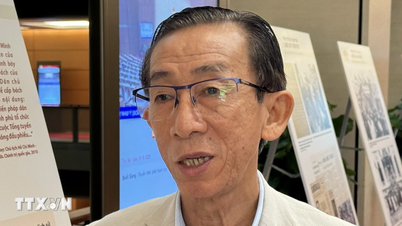

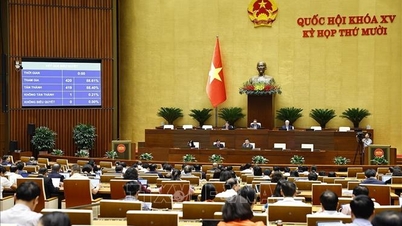
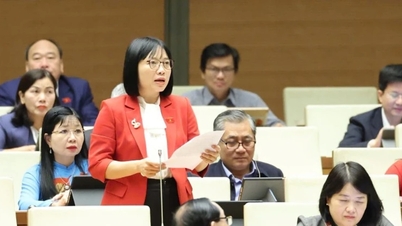

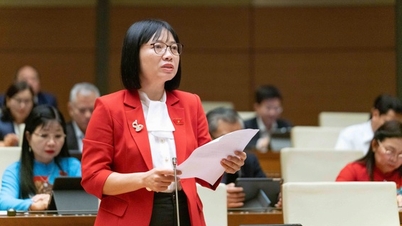

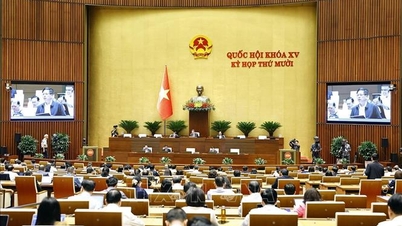
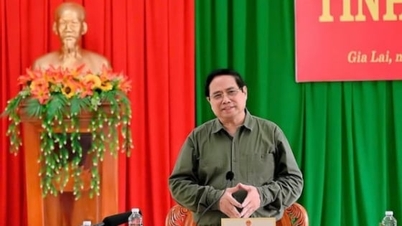


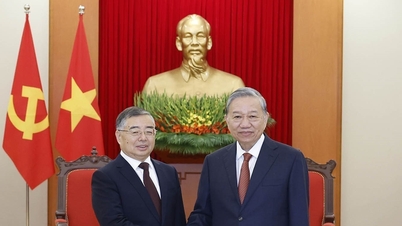

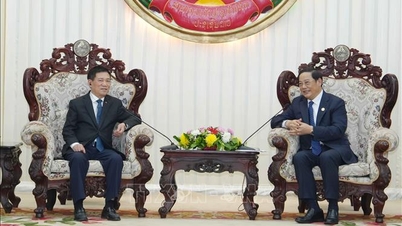









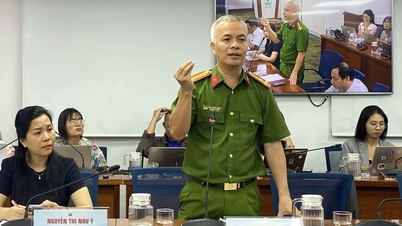







































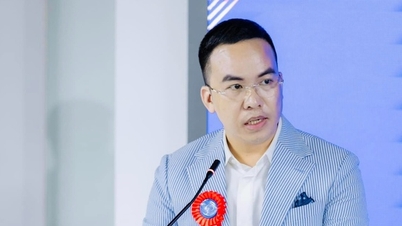


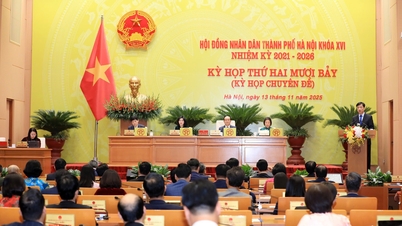

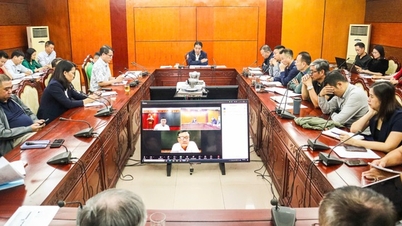

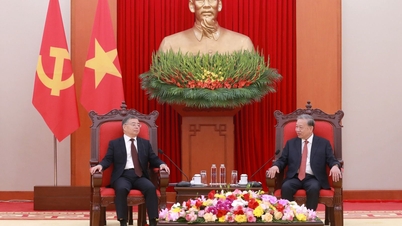








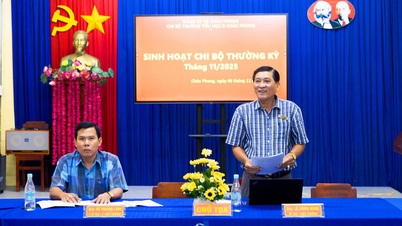





![Dong Nai OCOP transition: [Article 3] Linking tourism with OCOP product consumption](https://vphoto.vietnam.vn/thumb/402x226/vietnam/resource/IMAGE/2025/11/10/1762739199309_1324-2740-7_n-162543_981.jpeg)







Comment (0)